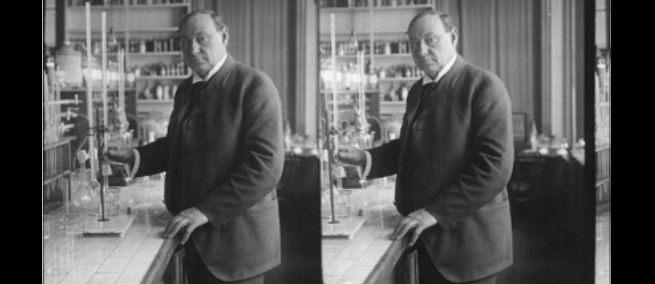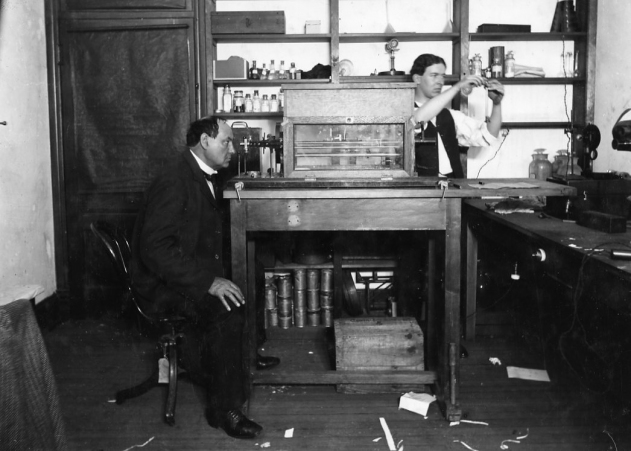
Thanks to THE POISON SQUAD, a new “American Experience” documentary on PBS produced with support from the Alfred P. Sloan Foundation, viewers can better understand how America’s food industry became less toxic. THE POISON SQUAD is written, directed, and produced by John Maggio, based on the Alfred P. Sloan-supported book by Deborah Blum. The documentary delves into the American food industry pre-FDA, and the political climate surrounding food laws in America.
In the late 19th century in America, industrialization was booming and people were relocating from rural farms to busy urban spaces. As food made its way from the remaining farms to cities, it spent days in transit, and then often sat on shelves for days after, until finally being bought by a consumer. Of course, for fresh food like meat, vegetables, and fruits, stalling unrefrigerated for days made the food inedible. No one would buy a visibly rancid product. In order to combat decomposition, businesses pumped chemicals into their products: salicylic acid plumped up wilting leafy greens, but resulted in severe burns in intestinal lining; borax restabilized meat if it was rotting, but caused harm to intestines and kidneys; and formaldehyde covered up the souring flavor of milk, but formaldehyde is a toxic chemical which results in death, even in relatively small amounts. Ground cow brains were often used to make milk thinned with water and chalk dust seem richer. At the time, these chemicals were mostly unstudied and their use wasn’t disclosed to consumers.
THE POISON SQUAD follows the career of Dr. Harvey W. Wiley, a food chemist who illuminated the disturbing truth of the American food industry for consumers, and worked relentlessly to fight for food reform. At the turn of the nineteenth century, Dr. Wiley worked for the Department of Agriculture and tested “honey” and “maple syrup” products on the market. Upon finding over 90% of the products labelled as one of these natural sweeteners were no more than tinted corn syrup, Wiley began his life's work: studying the harmful effects of chemical additives in food.

Harvey Wiley
In 1902, Dr. Wiley began the “Hygienic Table Trials” which assessed the effects of borax, salicylic acid, benzoic acid, potassium chromate, and many more chemicals with a group of 12 men deemed the “Poison Squad.” For free food and $5 a month, the Poison Squad ate only food provided to them by Wiley; to give samples of their stool, urine, perspiration, and hair regularly; and to allow doctors to take their vitals often. They ate three meals a day in a dining room under Dr. Wiley’s lab, and reported any symptoms they felt during and after the meal for the duration of the study. As a result, Dr. Wiley made empirical observations about the multitudes of negative effects the chemical additives being used to preserve food had on the human body.
Dr. Wiley’s controversial food findings antagonized major food producers, and angered multiple presidents with interests in food industry lobby groups. However, they found support from consumers. Even with a backlash from powerful corporations and governmental attempts to suppress his work and findings, Wiley appealed directly to the general public, even hiring a science writer to translate his research into more digestible reading.

The Poison Squad. Credit: FDA
Women–generally tasked running the household at this time–became advocates for better food. Upton Sinclair’s 1906 novel The Jungle, as well as accounts of investigative journalists, also helped to sway public opinion. In 1906 the Pure Food and Drug Act was passed. This was the first of multiple laws creating consumer protection, culminating in the formation of the Food and Drug Administration, which tests any product that falls under the cosmetics, consumables, and medical devices categories for their public health impact.
THE POISON SQUAD is now available for streaming on pbs.com. It features Deborah Blum, author of the book of the same name; Mark Bittman, food journalist, author, and former columnist for The New York Times; Corby Kummer, food journalist and senior editor at The Atlantic; Marion Nestle, Paulette Goddard professor of nutrition, food studies and, public health at New York University; Eric Schlosser, investigative journalist and author; and more. The documentary was produced with support from the Alfred P. Sloan Foundation through its over 20-year partnership with WGBH to spotlight the role of science and technology in history on the "American Experience."
Cover photo: Harvey Wiley, Courtesy of UC Riverside, California Museum of Photography
PARTNERS
TOPICS